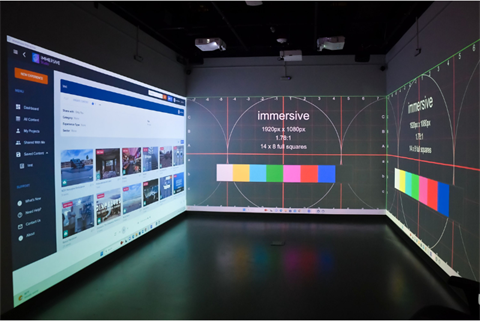EMS Simulation Center receives provisional accreditation
Published on September 22, 2025

The Simulation Center at Cabarrus County EMS has received provisional accreditation status by the Society for Simulation in Healthcare (SSH).
The Center offers comprehensive training and educational opportunities. The new accreditation will allow for further development and expansion backed by the support of SSH.
“This milestone reflects countless hours of dedication from our Education Department, especially Captain Karla Brown and Simulation Technical Specialist Alicia Marchand,” said EMS Deputy Chief of Administration Justin Brines. “Their leadership and expertise made this achievement possible.”
The 1600-square-foot space opened as part of the new EMS headquarters in 2023. It features a skills lab, scenario room and immersion room.
The skills lab allows EMS personnel to focus on specific competencies, practicing real-world procedures in a controlled environment. This training can include starting IVs, airway and breathing tube management, heart monitor operation and more.
The scenario room can be configured into different room layouts, including bedrooms and bathrooms. This allows for skills training in tight quarters and other difficult room layouts.
The immersion room features projection video walls that can be customized to most situations. The most common scenes are wrecks and public settings, such as restaurants and venues. Other sensory features, such as scent and sound, are integrated into the room’s hardware and software. Together, these features can create an environment that closely reflects what personnel could face on a call, according to Capt. Brown.
The rooms also feature hyper-realistic silicone manikins, which are lifelike models used for medical training. The Ares Emergency Care Simulator manikin features advanced capabilities, including talking, breathing, and heart monitor integration. With these manikins, EMS can practice airway management, breathing assessments and emergency medication treatment.
The entire center can be run from a control room, monitored by a Simulation Technical Specialist. Field Training Officers conducting training can provide immediate feedback.
All EMS personnel are required to participate in six training scenarios and special education opportunities each year, and they are encouraged to use the space for additional training.
“We bring them into our training space to utilize the same equipment that they would use providing care to our community,” Brown said.
The facility helps personnel feel more comfortable and confident, Brown added. Practicing scenarios in an immersive environment allows personnel to feel more prepared and give the best care possible in high-stress situations.
Creating a healthy environment is also beneficial to trainees, as they can identify strengths and weaknesses in a low-stakes environment.
The training center is primarily used by EMS, but other first responder agencies can request the space, Brown said.
“We hope to continue developing and expanding the program even further,” Brown said. “It’s a great opportunity to open up our doors and make our space available to other community partners.”
The space has also been used for special community events, including holiday celebrations. During Christmas events in recent years, the immersion room transformed into a winter wonderland where children could build their own virtual snowman.
Brown said the SSH accreditation came following an application process that includes a review of records, equipment and other details. The honor means that the center “meets those high standards and processes,” she added.
The provisional status is in place until the end of 2027. During that time, EMS will continue to work towards full accreditation. The application for full accreditation is more detailed, includes more in-depth clinical performance and a site visit.